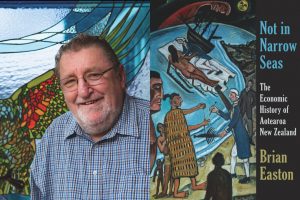New Zealand has not left the constraints of Rogernomics behind, according to veteran economist Brian Easton.
Brian Easton spoke with historian Geoffrey Rice about his book Not in Narrow Seas: The Economic History of Aotearoa New Zealand at The Piano in central Christchurch on Saturday (October 31) as part of the WORD festival. About 90 people attended the event.
Brian said there were still elements of neo-liberal economics under current finance minister Grant Robertson although the Covid crisis was disrupting the implementation of “austere economics”.
New Zealand’s failure to restructure its economy in the 1970s after a 40 percent cut in international wool prices in 1966 gave Roger Douglas and his supporters the opportunity to introduce their reforms of market liberalisation to the New Zealand economy under the David Lange-led government, elected in 1984.
“It was needed but it was taken to mad extremes. I think they were a pack of lunatics.”
Brian Easton was eager to stress that events long before people arrived at Aotearoa shaped New Zealand’s economy.
He cited the Lake Taupo eruption in 232CE (Common Era) which threw out ash that layered land to the east and north of the lake. But the ash lacked trace elements needed for livestock to thrive. Consequently there was little demand for the land held by central North Island iwi Ngāti Tūwharetoa who retained their holdings while other iwi suffered the confiscation of their lands by the Crown in the 19th century.
One of the reasons Tūhwharetoa were a successful and wealthy iwi was that they were able to successfully farm their retained lands when agricultural advances enabled them to add the missing trace elements to the soil in their lands, Brian said.
Geological events that occurred 23-85 million years ago when Aotearoa (as part of the continent Zealandia) separated from our trans-Tasman partner explained why Australia weathered the 1966 wool-price drop better than New Zealand. Australia was able to extract and trade valuable minerals that are not in this country.
“Geology did shape us,” Brian said.
Ironically New Zealand declined an opportunity to join the federation of Australian states in 1901 because Aotearoa was “so prosperous” at the time, he noted.
Brian had doubts about New Zealand’s poor productivity ratings when compared with OECD contemporaries. There was a problem with measurement, citing Luxembourg which rates highly. One of the reasons Luxembourg did so well was that many of the tiny state’s workers did not live there but commuted to work. Those workers’ productivity were counted even though they were not included in Luxembourg’s population.
Covid-19 had prevented an official launch of his book so Brian Easton said he regarded Saturday’s WORD event as a book launch which he appreciated as he saw Christchurch as his “turangawaewae” (an individual’s place in the world). He described Christchurch as a “strong, left-wing city”, initially due to the growth of manufacturing in the city in the early 20th century.





Add a comment to: WORD Christchurch 2020: Economist delves deep into the heart of Aotearoa